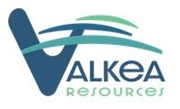New Found (NFG.V): Intercepts 62.3 g/t Au Over 2.00m at Keats Main, Extends High-Grade Zone to 845m Down Plunge
Vancouver, BC, February 24, 2022 – New Found Gold Corp. (“New Found” or the “Company”) (TSX-V: NFG, NYSE-A: NFGC) is pleased to announce assay results from 21 diamond drill holes targeting expansion of the Keats Zone (“Keats”) and to test for additional high-grade gold mineralization along the Appleton Fault Zone (‘AFZ’). These holes were drilled as part of the Company’s ongoing 400,000m diamond drill program at its 100%-owned Queensway Project (“Queensway”), located on the Trans-Canada Highway 15km west of Gander, Newfoundland.
Keats Drill Result Highlights
- Highlight intervals from this drilling are summarized below. Additional results are provided in Table 2.

¹Note that the host structures are interpreted to be steeply dipping and true widths are generally estimated to be 60% to 95% of reported intervals. Infill veining in secondary structures with multiple orientations crosscutting the primary host structures are commonly observed in drill core which could result in additional uncertainty in true width. Intervals are calculated at a 1 g/t Au cut-off grade; grades have not been capped in the averaging.
- The interval of 62.30 g/t Au over 2.00m in NFGC-21-387 (see Figures 2 and 3) is interpreted to occur within the Keats Main Zone (hosted in the Keats baseline fault) and is located approximately 315m down-plunge from the previous furthest down-plunge high-grade intercept of 61.5g/t Au over 5.20m in hole NFGC-21-360 (see October 14, 2021, news release). Ongoing drilling continues to test the continuity of high-grade gold mineralization in the Keats Main Zone including over this 315m interval.
- The intercept of 8.79 g/t Au over 8.25m in NFGC-21-297 is located approximately 80m up-dip from two previously reported high-grade intervals of 21.36 g/t Au over 8.05m and 14.92 g/t Au over 12.85m in hole NFGC-21-204 (Figures 2, 3, and 4).
- Intercepts of 28.16 g/t Au over 5.55m in NFGC-21-263 and 43.78 g/t Au over 3.10m in NFGC-21-272 further define the extent of the high-grade gold mineralization and confirm its continuity within the Keats Main Zone.
- The Keats Main Zone remains open in all directions and exploration will continue to target the expansion of high-grade gold mineralization in this zone. Drilling at Keats will also continue to step-out on multiple additional high-grade gold intervals intercepted in additional vein sets at varying interpreted orientations including in the Keats footwall.
- NFGC-21-144 was drilled another approximately 400m south of NFGC-21-387 in an area named the Trans-Canada Highway Zone (‘TCH’). This hole intersected a near surface fault zone containing gold-bearing quartz veins that returned intervals including 1.77 g/t Au over 3.10m and 1.72 g/t Au over 7.10m. These intervals displayed textures and mineralization typical of high-grade gold mineralization defined in other areas along this segment of the AFZ (Figure 3). Follow up drilling in this area will commence shortly.
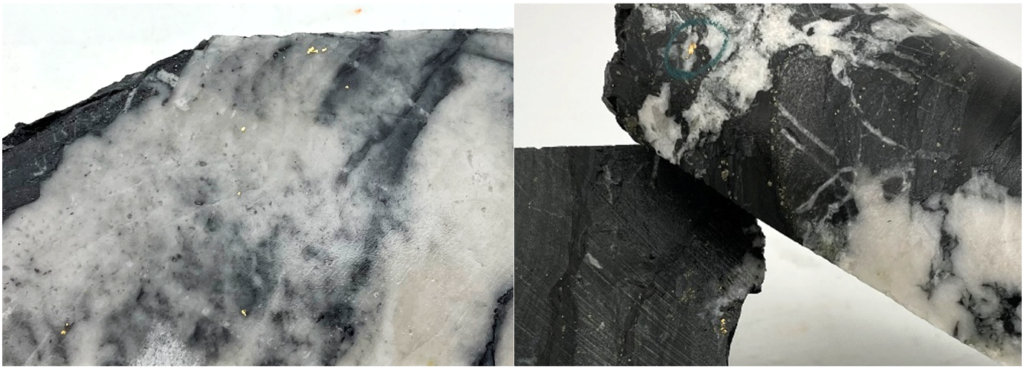
^Note that these photos are not intended to be representative of gold mineralization in hole NFGC-21-263 and NFGC-21-387
Melissa Render, V.P. Exploration for New Found, stated: “Keats has now delivered outstanding intervals of high-grade gold over +800m of strike and to 375m of vertical depth. Drilling in the Keats baseline fault has focused on extending an interpreted thickened, south plunging dilation zone and on extension of this high-grade gold mineralization from the dilation zone to surface. To date we have completed very limited drill testing below this dilation zone. The multiple additional high-grade gold intercepts in other structures outside of the Keats baseline fault is building increasing complexity in the interpreted host vein geometry at Keats. The strike and vertical extent of the high-grade gold mineralization in these multiple vein sets is very encouraging in expanding the dimensions and envelope of the high-grade gold system at Keats.
Big picture we continue systematic exploration drilling along the AFZ, continuing step out drilling at the Golden Joint and Lotto Zones along a +2.5 km trend. In parallel we continue to add to and drill test multiple targets along +20km of total strike on the Appleton and JBP fault zones on Queensway North. The intercepts in hole NFGC-21-144 south of the Trans-Canada Highway adds one more target to be pursued in our ongoing work.”
Keats Zone Location Details
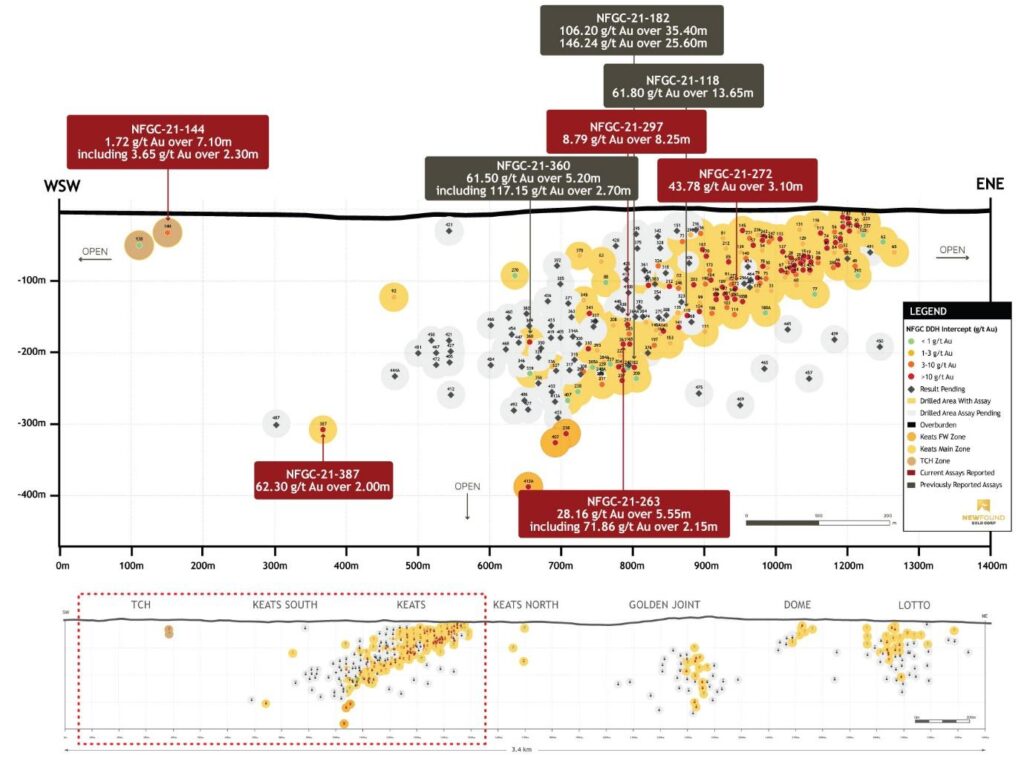
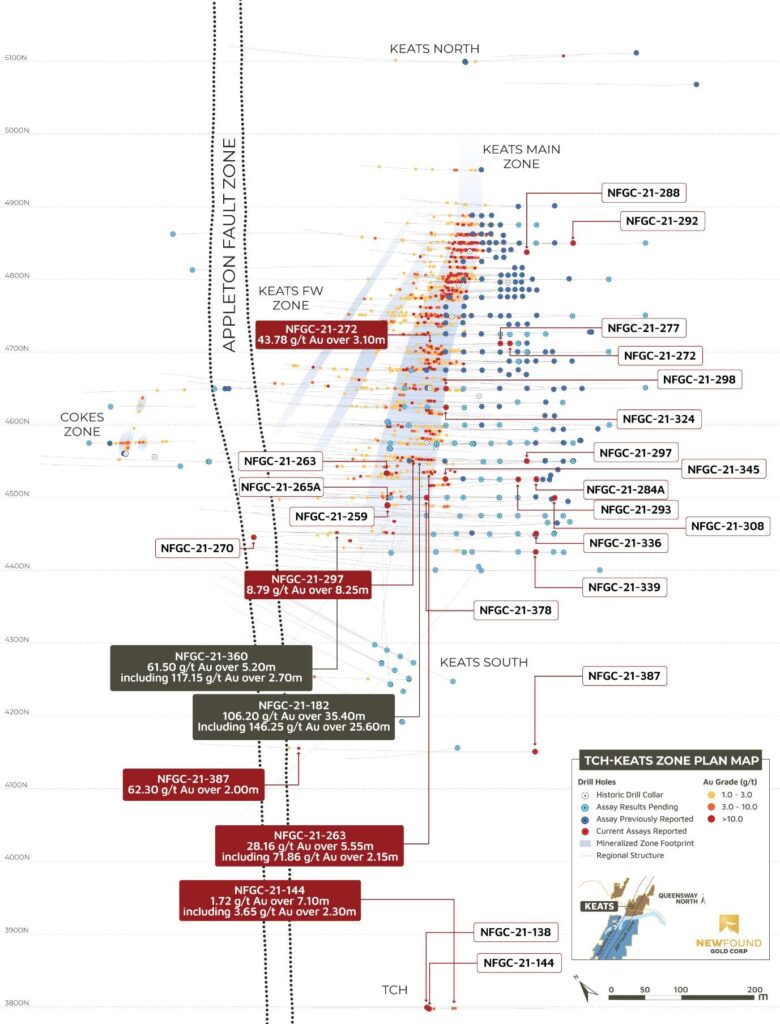
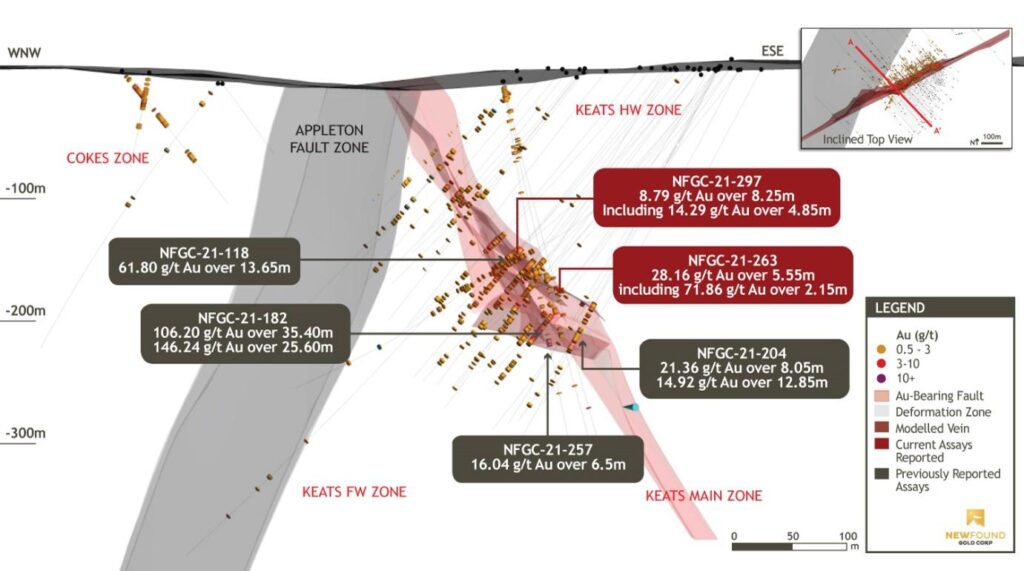
Drillhole Details
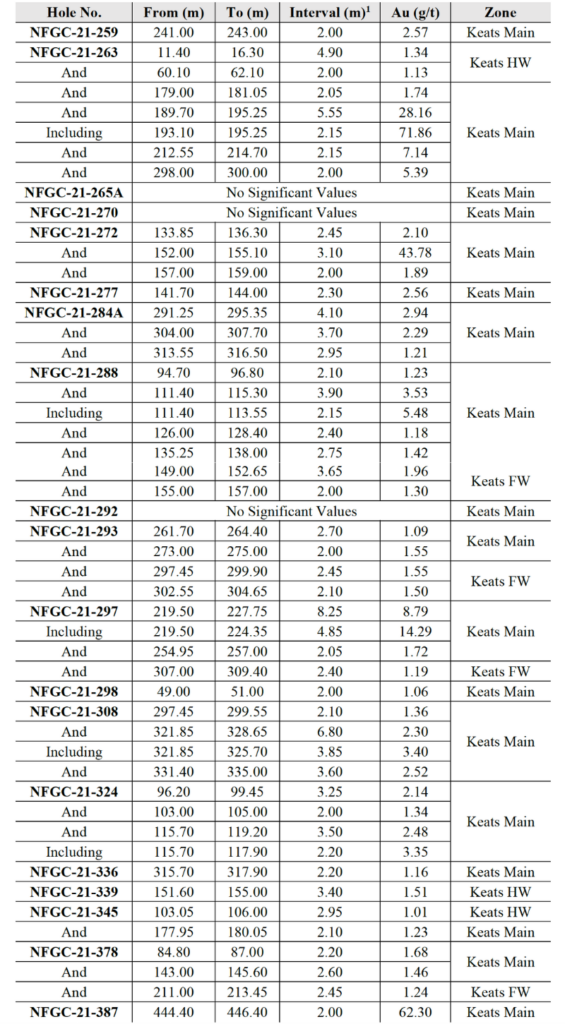
¹Note that the host structures are interpreted to be steeply dipping and true widths are generally estimated to be 60% to 95% of reported intervals. Infill veining in secondary structures with multiple orientations crosscutting the primary host structures are commonly observed in drill core which could result in additional variability in true width. Intervals are calculated at a 1 g/t Au cut-off grade; grades have not been capped in the averaging.

¹Note orientations of the mineralized intervals have insufficient information at this time to determine a true width. Intervals are calculated at a 1 g/t Au cut-off grade; grades have not been capped in the averaging
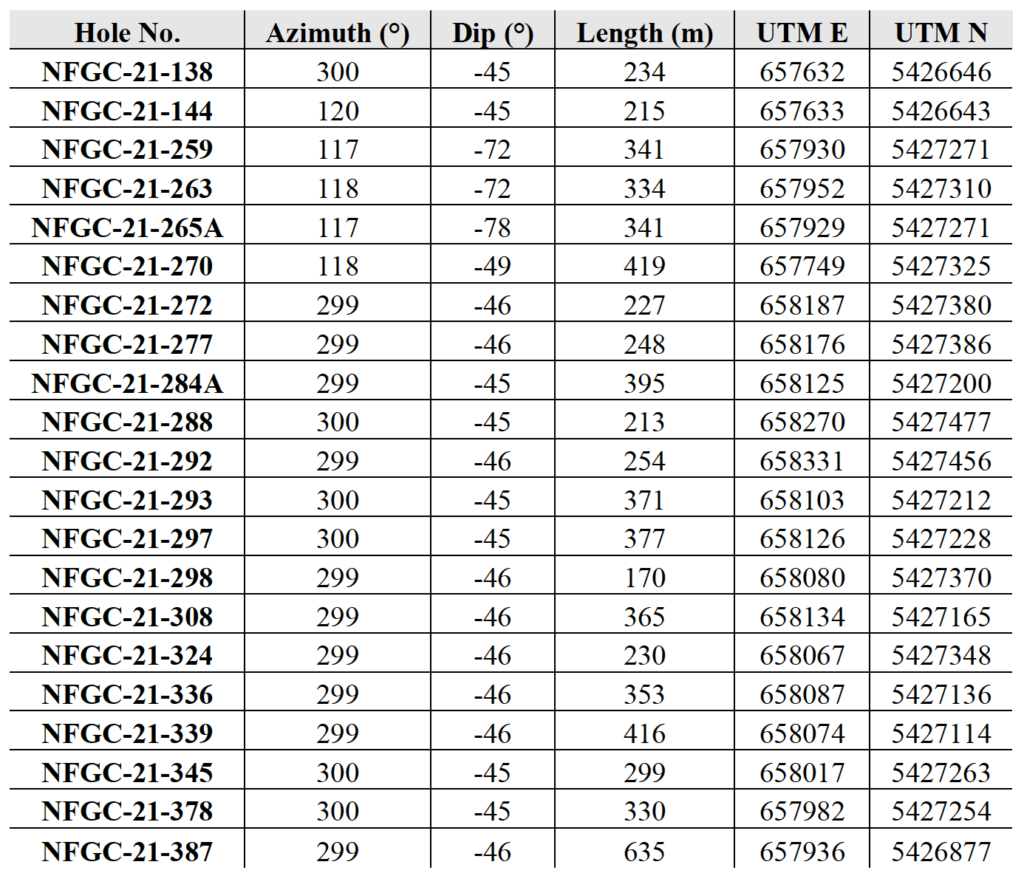
Queensway 400,000m Drill Program Update
Approximately 35% of the planned 400,000m program at Queensway has been drilled to date with approximately 28,500m of the core with pending assay results. Ten core rigs are currently operating and New Found is targeting an increase in the drill count to 14 rigs by the end of Q1 2022.
Sampling, Sub-sampling, Laboratory and Discussion
True widths of the intercepts reported in this press release have yet to be determined but are estimated to be 60% to 95% of reported core lengths. Infill veining in secondary structures with multiple orientations crosscutting the primary host structures are commonly observed in drill core which could result in additional variability in true width. Assays are uncut, and calculated intervals are reported over a minimum length of 2 meters using a lower cut-off of 1.0 g/t Au. All HQ split core assays reported were obtained by either complete sample metallic screen/fire assay or standard 30-gram fire-assaying with ICP finish at ALS Minerals in Vancouver, British Columbia, or by entire sample screened metallic screen fire assay at Eastern Analytical in Springdale, Newfoundland. The complete sample metallic screen assay method is selected by the geologist when samples contain coarse gold or any samples displaying gold initial fire assay values greater than 1.0 g/t Au. Drill program design, Quality Assurance/Quality Control and interpretation of results is performed by qualified persons employing a Quality Assurance/Quality Control program consistent with National Instrument 43-101 and industry best practices. Standards and blanks are included with every 20 samples for Quality Assurance/Quality Control purposes by the Company as well as the lab. Approximately 3% of sample pulps are sent to secondary laboratories for check assays.
Qualified Person
The technical content disclosed in this press release was reviewed and approved by Greg Matheson, P. Geo., Chief Operating Officer, and a Qualified Person as defined under National Instrument 43-101. Mr. Matheson consents to the publication of this news release dated February 23, 2022, by New Found. Mr. Matheson certifies that this news release fairly and accurately represents the information for which he is responsible.
About New Found Gold Corp.
New Found holds a 100% interest in the Queensway Project, located 15km west of Gander, Newfoundland, and just 18km from Gander International Airport. The project is intersected by the Trans-Canada Highway and has logging roads crosscutting the project, high voltage electric power lines running through the project area, and easy access to a highly skilled workforce. The Company is currently undertaking a 400,000m drill program at Queensway, now approximately 35% complete. The Company is well funded for this program with a current working capital balance of approximately $118 million.
Please see the Company’s website at www.newfoundgold.ca and the Company’s SEDAR profile at www.sedar.com.
Acknowledgements
New Found acknowledges the financial support of the Junior Exploration Assistance Program, Department of Natural Resources, Government of Newfoundland and Labrador.
Contact
To contact the Company, please visit the Company’s website, www.newfoundgold.ca and make your request through our investor inquiry form. Our management has a pledge to be in touch with any investor inquiries within 24 hours.
New Found Gold Corp.
Per: “Craig Roberts”
Craig Roberts, P.Eng., Chief Executive Officer
Email: [email protected]
Phone: +1 (845) 535-1486
Neither the TSX Venture Exchange nor its Regulation Services Provider (as that term is defined in the policies of the TSX Venture Exchange) accepts responsibility for the adequacy or accuracy of this release.
Forward-Looking Statement Cautions
This press release contains certain “forward-looking statements” within the meaning of Canadian securities legislation, relating to assay results, exploration and drilling on the Company’s Queensway gold project in Newfoundland, interpretation of the assay results and the results of the drilling program, the discovery of zones of high-grade gold mineralization, follow-up step-out drilling and funding of the drilling program. Although the Company believes that such statements are reasonable, it can give no assurance that such expectations will prove to be correct. Forward-looking statements are statements that are not historical facts; they are generally, but not always, identified by the words “expects,” “plans,” “anticipates,” “believes,” “intends,” “estimates,” “projects,” “aims,” “suggests,” “potential,” “goal,” “objective,” “prospective,” “possibly,” and similar expressions, or that events or conditions “will,” “would,” “may,” “can,” “could” or “should” occur, or are those statements, which, by their nature, refer to future events. The Company cautions that forward-looking statements are based on the beliefs, estimates and opinions of the Company’s management on the date the statements are made, and they involve a number of risks and uncertainties. Consequently, there can be no assurances that such statements will prove to be accurate and actual results and future events could differ materially from those anticipated in such statements. Except to the extent required by applicable securities laws and the policies of the TSX Venture Exchange, the Company undertakes no obligation to update these forward-looking statements if management’s beliefs, estimates or opinions, or other factors, should change. Factors that could cause future results to differ materially from those anticipated in these forward-looking statements include risks associated with possible accidents and other risks associated with mineral exploration operations, the risk that the Company will encounter unanticipated geological factors, risks associated with the interpretation of assay results and the drilling program, the possibility that the Company may not be able to secure permitting and other governmental clearances necessary to carry out the Company’s exploration plans, the risk that the Company will not be able to raise sufficient funds to carry out its business plans, and the risk of political uncertainties and regulatory or legal changes that might interfere with the Company’s business and prospects. The reader is urged to refer to the Company’s Annual Information Form and Management’s Discussion and Analysis, publicly available through the Canadian Securities Administrators’ System for Electronic Document Analysis and Retrieval (SEDAR) at www.sedar.com, for a more complete discussion of such risk factors and their potential effects.





